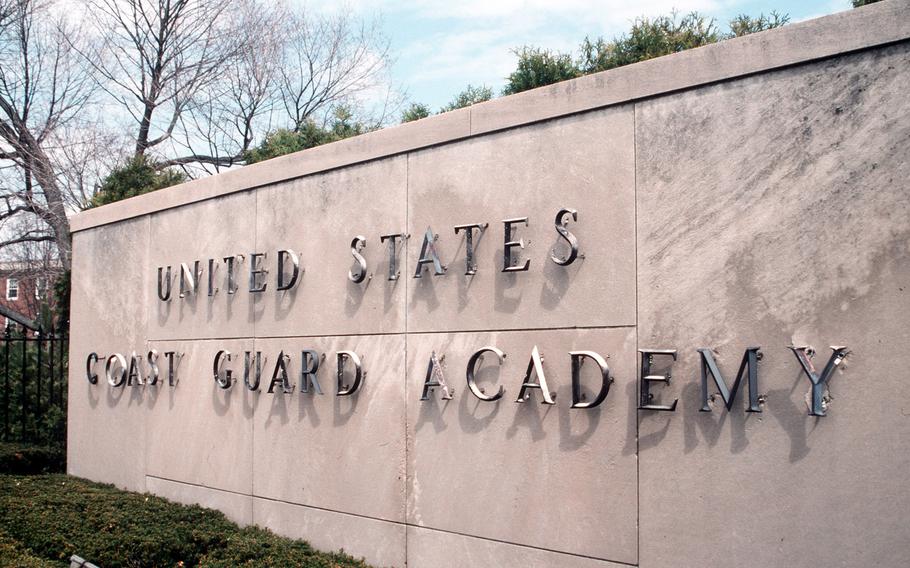
A sign for the U.S. Coast Guard Academy in New London, Conn. (David M. Santos/U.S. Coast Guard)
Last week we learned of the stunning lack of transparency and accountability by the U.S. Coast Guard and its decades-long culture of cover-up regarding sexual harassment and sexual assault. It was only after a whistleblower recently leaked the Operation Fouled Anchor report, which identified over 60 substantiated incidents of rape, sexual assault and sexual harassment that had been ignored or covered up, that Coast Guard officials were forced to acknowledge this disgraceful past.
The depth of these failures was on full display on Dec. 12 during a hearing convened by the Senate permanent subcommittee on investigations where four survivors spanning nearly 50 years — Jennifer Yount, Caitlin Maro, Melissa McCafferty and Kyra Holmstrup — testified about a military culture that too often protects perpetrators of sexual violence at the expense of their victims.
In powerful, often heart-wrenching testimony, these brave women shared their stories, and they showed that these problems are not just a feature of the Coast Guard’s past — but woven into its operations today. Each of these women described the harassment and assault they survived, the lack of accountability from campus leadership, and the ostracization they experienced after speaking out. Despite the decades in between their stories, they were united by a shocking, nearly absurd, indifference to their experiences by Coast Guard leadership, which has been more inclined to punish them for speaking out than to effectively address the problem.
In light of these revelations and the leaked Operation Fouled Anchor report, which addresses incidents from the 1980s through 2006, there are real questions about how the Coast Guard has, until now, avoided the reckoning that other branches of our military have experienced in the last decade. The key difference it seems is that the Coast Guard, unlike the rest of the armed forces, is housed under the U.S. Department of Homeland Security, not the Department of Defense, meaning that many reforms put in place to protect female service members, including actions spurred by the 2020 murder of Army soldier Vanessa Guillén, do not necessarily apply to the Coast Guard.
One critical example for what this means: unlike other military academies, the Coast Guard Academy is not subject to the DOD “Safe-to-Report” policies. These recently enacted policies protect survivors of sexual assault from being punished for minor misconduct associated with their report, including underage drinking, curfew violations, and other school rules, because the threat of punishment may prevent people from coming forward. In the testimony of Yount, class of 1981, she recalled how she and her roommate received demerits for the damaged door her attackers broke down — a punishment that pushed her into silence for more than a year.
As the survivors also testified, many other factors, including re-enlistment rules, pervasive retaliation for reporting, both on the Academy and across the Coast Guard generally, and inadequate training and supervision throughout the chain of command, all act as features of this oppressive system that keeps many silent. The goal of the Coast Guard has not been to protect its service members, but rather to avoid any appearance of wrongdoing.
The Operation Fouled Anchor report reads: “This investigation made clear that the [Academy’s] leadership was more concerned at that time about organizational and [Academy] reputation than about the victims of crimes who were members of our service.” In short, the Coast Guard has refused to act in the past, out of fear of negative publicity. By suppressing this report, Coast Guard leadership has demonstrated that its priorities are similarly skewed today.
The women who testified to the Senate are calling for a meaningful acknowledgment of the harms they have experienced, effective new policies to make cadets and service members safer, and true accountability for perpetrators, and those who enable them. The changes they call for are not revolutionary; they’re rooted in basic common sense and decency. They include reassessing reenlistment codes so cadets removed from the Academy for sexual assault cannot return, enforcing no-contact orders, and applying Safe-to-Report policies to the Coast Guard Academy.
As evidenced by this unusually bipartisan hearing, this issue has attracted Congress’ attention, and lawmakers’ justifiable outrage. I am hopeful that Congress will do right by survivors by insisting upon a simple yet elusive answer to this problem: accountability. Without swift and sure consequences for this kind of misconduct, which has been pervasive throughout the Coast Guard (and across all branches of the military), it will never stop. To rebuild the trust of cadets, active service members, and the Coast Guard community at large, there can be no more cover-ups and no more excuses. Until the Coast Guard gets serious about transparency and accountability, nothing will change.
Lisa Banks is a founding partner of Katz Banks Kumin LLP, where she concentrates her practice on sexual harassment and whistleblower retaliation, and one of the leading attorneys of the #MeToo movement. She currently represents Jennifer Yount, Caitlin Maro, Melissa McCafferty and Kyra Holmstrup.